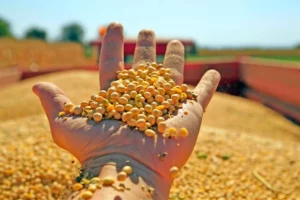In a surprising twist, low-priced Brazilian soybeans have caught the attention of U.S. buyers, including major poultry producer Perdue Farms.
Despite abundant local stocks post-harvest, Perdue Farms has reportedly purchased three shipments of Brazilian soybeans, a move that has caught traders off guard.
This development is unusual, as it’s the first time since 2019 that the U.S. has imported Brazilian soybeans during this period of the year.
In 2019, 2009, and 2004, the U.S. actively imported Brazilian soybeans, primarily in the early months of January or February.
The increase in Brazilian soybean purchases indicates a stronger-than-expected recovery of Brazil’s soybean crops after regional droughts.

Current projections suggest this year’s production could rank as the second-largest ever.
Brazilian soybeans are currently trading at over $1 per bushel less than Chicago futures, making them an attractive option for U.S. buyers.
In contrast, soybeans from the southern U.S. ports are trading at a premium.
The shipments from Brazil are set to be delivered to the U.S. East Coast next month, coming from the Amazon region ports of Santarém, Barcarena, and Itacoatiara.
U.S. buyers shifting to Brazilian soybeans early is unusual, as they typically do so mid-year when domestic supplies decrease.
This shift in trade dynamics demonstrates the global interconnectedness of agricultural markets and the influence of competitive pricing.
Global pricing shifts affect purchasing decisions worldwide, emphasizing the dynamic nature of global trade and its impact on agriculture.

